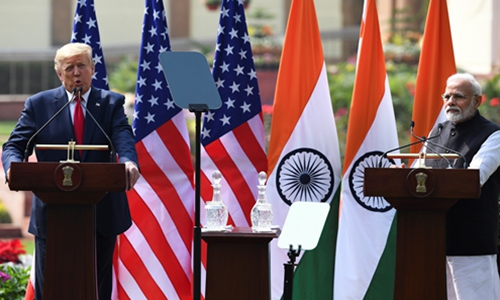Washington feeds off New Delhi’s impulsiveness
By Yu Ning Source:Global Times Published: 2020/6/17 22:28:40

US President Donald Trump speaks as India's Prime Minister Narendra Modi listens during a joint press conference at Hyderabad House in New Delhi on February 25, 2020. Photo: AFP
Soon after a serious clash between Indian and Chinese troops in the Galwan Valley on Monday night, the US quickly showed support to India. A US State Department spokesperson on Tuesday night offered condolences to the families of 20 Indian soldiers who died in the clash, saying the US was "closely monitoring the situation between Indian and Chinese forces along the Line of Actual Control." Although the spokesperson also said the US supports a peaceful resolution of the current situation, it's pure diplomatic rhetoric.
Border tensions have escalated recently between India and China - this is what the US, which is grappling with both internal and external troubles, wants to see. The US strongly desires emerging hotspots in other places of the world to distract media attention from the spreading COVID-19 epidemic and anti-racism unrest that are plaguing the country.
Since this round of China-India border face-off started in May, the US has blamed it on "Chinese provocations." US Secretary of State Mike Pompeo and Eliot Engel, a senior Democratic congressional leader, in early June reprimanded China for its bullying behavior toward India, which was interpreted by Indian newspaper The Tribune as India gaining bipartisan support from the US in the border stand-off.
The US wants to woo New Delhi and create an illusion that India has the back of the US and other Western countries. Some hawkish forces in India have become increasingly impulsive and irrational in provoking conflict with China, partly resulting from US instigation and encouragement. India's importance in the US strategic chessboard is proportional to how the US views China as a threat.
The Trump administration has insisted on the "America First" doctrine since it came to office, showing less interest in getting involved in international affairs. Trump emphasized the US is not the world's policeman during his commencement address at West Point Saturday. But Washington is enthusiastically interfering in the India-China border spat, as it is where the US strategic interests lie, and inciting India against China best serves US interests.
India, the largest democracy in the world, seemingly gets the support of Western democracies when there is a dispute between New Delhi and Beijing. But "the largest democracy" is just a label Western countries gave to India. Don't forget, the US has also unscrupulously accused India of violating human rights.
An annual report by the US Commission on International Religious Freedom in April named India a "country of particular concern" on religious freedom. Narendra Modi, Indian Prime Minister, was denied a visa to the US in 2005 on religious freedom grounds when he was chief minister of the Indian state of Gujarat.
India is considered a very important strategic pillar for the US to contain China in the Indo-Pacific region and a powerful counterbalance to the rising China. The US will exploit every possible chance to encourage India to act on US interests, but chess pieces manipulated by the US may not achieve what they hope for.
Posted in: OBSERVER,CHINA-INDIA